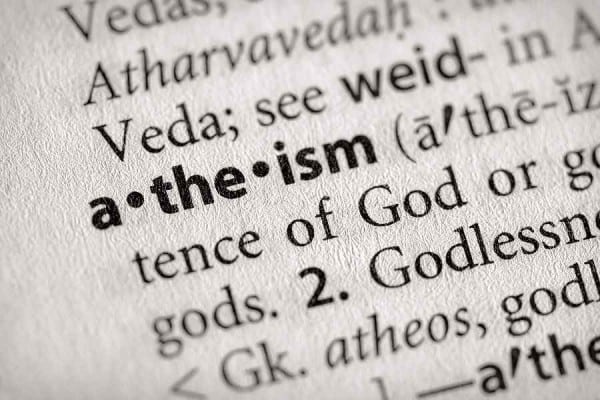Editor’s note: prior installments of the “How to Be an Atheist” letters – part 1 & part 2.
***
Dear Tim,
I must say, your response to my second letter was excellent. It is quite evident that you are thinking about these things, and in the process you are pushing me to think more deeply about the whether or not we can ask reasonable questions about there being anything as well. Can we call into the question the whole thing? Is it legitimate to ask why there is something rather nothing? I’ve been asking myself just such questions over this past week.
And it seems to me that such ‘Why’ questions need even further elaboration. I’ve been thinking about it this way: Imagine that the two of us walk into a chemistry lab. Immediately upon entering a man approaches us wearing a lab coat and holding two little jars with some powder in them. He hands one to each of us and eagerly says, “eat it!” “What is it?” you ask. “Cyanide,” comes the assistant’s reply. Are we apt to eat such a thing? Of course not – we’re not idiots. Likely we’ll both throw the jars in the trash and be about our way (what were we doing in a chemistry lab anyway?) But the fact is that you and I both know what effect cyanide has on humans: death. Having studied biochemistry, we know both what cyanide is and what it does. When we think along such lines medieval philosophers held that we were following a propter quid line of reasoning – we know what the cause of death would be (cyanide) and we can anticipate its effects. We start with the known and work our way out based on the properties of the known thing.
The question your last letter got me thinking more deeply about is whether we can think about God in the same way. It seems to me that Aquinas was too good of a philosopher to think that a propter quid argument was overly helpful in demonstrating that the word ‘God’ referred to some thing. Why? Well, for starters, the causes we are familiar with operate on the map of creation. Generally speaking, in a propter quid argument we start with an ens, a particular thing, and work our way out toward its effects. If you are a clerk at an appliance shop and I try to return my washing machine because it refuses to sing love songs to me, you’ll think I’ve gone mad – washing machines wash clothes, they don’t sing love songs. But you can only conclude that I’m mad because you know what a washing machine is and therefore know what it should do. Knowing the cause, you can anticipate its general effect. Upon hearing my response, you’ll look for hidden cameras or, if I grow increasingly angry at your refusal to help me, you’ll call the police.
Now here’s the rub. If there is a God, that God cannot be just another thing on the map of creation. (It seems to me that this is close to what you said in your last letter as well, but please correct me if I’m wrong). But why can’t God just be another thing? I think it’s because any thing that is on the map of creation cannot, itself, account for the sheer existence of the map. Anything on the map is a part, an ens, and cannot itself be the reason for the whole. What I mean by this is: when we discuss whether or not there is a God, our investigation cannot begin by treating God as just another ens. Whatever God is, God is not a “+1” in a rational series. As Denys Turner puts it, you couldn’t count up everything in the universe and then say, “Oh, and God.” I guess we could say that God is the weirdest of things, wholly unlike any other thing we happen upon in our daily lives. This is because it is God who is the reason there are things at all.
So if God is not any thing on our map, it would seem that our usual method of demonstration is forbidden us. What, then, does the theist do? Well, Aquinas thought that another mode of demonstration remained. This kind of demonstration is called a quia demonstration, and it works backwards, from effects to causes. Another example may help.
Suppose I walk into the Jesuit Residence one morning only to find our beloved Father Peppard at the foot of the stairs with a knife in his back. My heart starts beating 200 times a minute. I look around. I remind myself to breathe. I check to see if he is breathing. I call the police. Why? Well, I’ve been around long enough to know how infrequent it is to come upon someone with a knife in his back. My assumption is that someone has put this knife there (and even that this person may well be lying in wait for me). In other words, when you see the word quia think of CSI: CSI always begins with a corpse and works back to a culprit; similarly in a quia demonstration, we begin with an effect and try to figure out (1) if there is a cause and (2) what that cause is.
To be fair, in the hypothetical (God forbid!) murder of Father Peppard, I’m arguing from ens to ens. I am arguing from effect to cause (knife to a murderer, in our case). But what I am looking for is evidence of a causal thing, another ens, that has brought about some type of effect. This ens could be tested, examined, and submitted in a court of law if necessary.
Here’s the rub, though, God is not some type of ens. If we tallied up the contents of the universe, the ens commune, we’d never come upon some thing that we’d stick the God label upon. And were we to rely solely on propter quid thinking, we’d be up the proverbial creek. Given our other line of investigation, however, all may not be lost. Is it not legitimate to look out at the world around us, to marvel at its existence, and pose the question “Why is there anything at all?”
Tim, it seems to me that you were getting at something like this in your last letter. And indeed it is a “real issue,” as you put it. You can seize the mantle of atheist if you can demonstrate (1) that this is a foolish question or (2) answer it without an appeal to God. If you’re going to answer it well, though, it seems to me that two things must figure into your argument. First, if you are going to show that it is a foolish question, you need to show that the map of creation just is (you well know that I find without argument to be unsatisfying!). Second, if you take the question seriously, it would seem to me that whatever it is that accounts for there being something rather than nothing cannot itself be a thing on the map.
There’s no getting around it: I am making a strong demand here, Tim. I am asking that you either show me that it is nonsensical to raise the question or to take seriously the question and answer it without recourse to any ens. If you can do this, you’ll have donned the atheist mantle and done many of us a great service. Speaking for myself, if you can show that there is no God, then I’ll be much obliged: I could see myself as a marginally effective defense attorney or, failing that, an alligator wrestler. But in all honesty, if there is no God then there is no reason for me to be a Jesuit.
I remain yours sincerely,
Mr. Ryan Duns, SJ
AKA: Crocodile Captain
***
Editor’s Note: read the next letter by clicking here.




